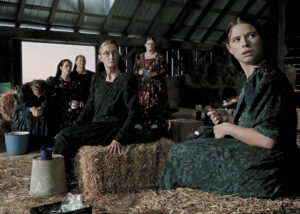Nearly 100 years have passed since 21,000 Mennonites fled disease, starvation and violence in some of the same areas now experiencing war in Ukraine. Many came to Southern Manitoba, and their trauma quietly came with them.
In the last year, I took a sabbatical from my work as a counselling therapist at Brandon University in Brandon, Manitoba, to interview Mennonite women about the intergenerational impact of the trauma experienced in southern Russia in the 1920s.
The people who migrated are gone, but their daughters and granddaughters, who I interviewed, carry stories of horror far beyond what I had been aware of. The more we read about history, particularly history from the perspective of those who suffered, as opposed to those who conquered, we see that suffering is something we all share. However, the impact of suffering is not the same from one community to another or from one person to another.
I asked the women I interviewed to reflect on the impact the experiences of the previous generation(s) have had on them. A common theme they were all taught was of God’s deliverance and their ancestors’ deep thankfulness. The 1920s women did not teach that the terrible experiences were a punishment by God, nor was there a sense of vengeance or anger. These daughters and granddaughters learned to be positive and thankful.
One daughter expressed the intergenerational impact well when she said her mother’s story “adds to the big burden of sadness of life.” Her mother came to Canada as a widow with a young child. As a woman she had few prospects except to work as a domestic or marry again. As was typical, her mother lived in a culture where her gender offered few opportunities to express gifts and talents or contribute a significant sense of meaning to her life outside her role as wife, mother and caregiver. This daughter’s family of origin did not discuss topics of gender equality, feminism or sexualized violence, and she often felt her mother’s almost intangible melancholy or sadness related to these issues, which has had a lifelong impact on her.
Too often the generational impact of trauma takes the form of addiction, violence and/or general anti-social behavior; refugee families often struggle to keep their children out of gangs or criminal involvement. Although none of the women in my study expressed concern that the trauma had resulted in these issues, they did indicate that their physical and psychological health may be paying a price for the untold stories. Their family culture impressed upon them the need to keep negative sentiments to themselves, as the painful stories needed to stay in the past. I see this symbolized in one family’s description of their home growing up. In this home, there was a photo in a drawer of a loved one lost to the chaos in southern Russia. The family had a concept of who was in the photo, but the stories related to that photo, like the photo itself, remained in the drawer, untold.
A daughter whose mother came to Canada as a toddler relayed how she learned it was due to God’s faithfulness that the family settled in a new land. Her mother’s family stressed how fortunate they were to have found freedom and that they should be ever thankful to God for “being delivered.” Her method of showing this thankfulness was “making use of the opportunities in this place and by living a good example.”
The women spoke of an ethic passed down where a positive example, and being faithful, both to their God and to their family legacy of loving kindness, was important. The daughters and granddaughters all mentioned that their families did not explicitly teach Christian faith in their homes, except for table grace and the odd scripture passage read on special occasions. However, most (not all) attended church growing up. They all learned a steadfast work ethic of care and compassion.
In my work as a therapist, clients often wonder why we talk about their past, given that it seems easier and less painful to just manage symptoms in the here and now. However, I believe that sorting out our history gives us tools, language and information that helps us make sense of why we act the way we do and why we feel the way we do. This helps us manage our mental health.
As researchers understand trauma better, we are learning that trauma is transmitted through the generations through both nurture—via family systems, culture and language—and nature, through physical illness, chronic pain and mental health issues. No person is immune to the trauma experienced by their ancestors.
My father’s family were among the 21,000 Mennonites who made the trek to Canada 100 years ago. Given this emerging knowledge about trauma and its impact on us through time, I decided to explore how my own history has impacted women like me, generations later.
I am finding as I pursue this project that the more I discover, the more there is to discover. Generational grief and trauma are complicated and multifaceted issues. Among other topics to explore, I would like to interview more women and better understand the impact of their perception of God’s role in their suffering and the impact their peace theology had on trauma recovery through the generations.








Leave a Reply
You must be logged in to post a comment.